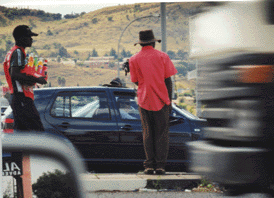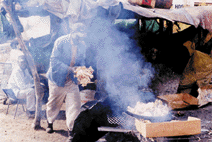Aage Langhelle
"(con)temporary" South Africa
(con)temporary as a combination of temporary and contemporary. In this project the central issues are social spaces and constructions that are created more or less by coincidence or improvisation (informal structures). During my three months long stay in South Africa I focused on Hawkers and Spaza shops. (A. Langhelle)
|
|
From a post-colonial point of view
Perception is a complex process, not only in a physiological, but also
in a political sense. In the age of post-colonialism the conditions of
perception become even more complex. Here and now it becomes clear that
such a thing as an innocent view does not exist any more. However, the
search for the view of the guilty cannot result in a simple answer either,
for the post-colonial view includes the colonized as much as the colonizer.
In sum, one could say there are four different perspectives: the colonizer’s
view of the colonized and vice versa, as well as each one’s perception
of him/herself. But anyone describing these perspectives will face a further
problem, since the perception itself is also perceived.
Aage Langhelle’s work for the exhibition "Rest in Space" is a presentation of these conditions. The artist spent three months taking photographs in South Africa. As a white tourist he was immediately recognized as a foreigner whose camera was also regarded as a threat. Aage Langhelle compensates this "photographic assault" by presenting the photos in the frame of an installation. This installation is a reconstruction of an improvised market stall of a kind to be found in many parts of Johannesburg. These serve to provide a living for the South Africans who, since the end of apartheid, still live in poverty. The reconstruction of these shacks is not presented as an imitation, but as a kind of image which again includes further images – the mentioned photographs. The pieces of timber that are used still show their price tags and look fresh and new. This is not a faithful reconstruction, as the very title of the work, "(con)temporary", shows, since contemporary becomes temporary, and thus opposes any claim for conservation.
The temporary
aspect of photography is identical with the temporary aspect of the installation,
which furthermore refers to the temporary spazashops in South Africa.
At the same time the construction of the space, of the installation, refers
to the photographs’ conceptual construction. For the view is not
innocent, but Aage Langhelle adds notes to the pictures which explain
and clarify the situation.
Perception in the pictures meets with perception in the texts and is furthermore
in dialogue with the perception of a reconstruction. Thus the view is
refracted in itself and becomes reflected in a double meaning.
From a post-colonial point of view we may also learn that things are not as straightforward as they are presented as being in the media. George Monbiot writes about Robert Mugabe in Süddeutsche Zeitung: "The governments of the rich world do not like land reforms, since they require state intervention, which offends the god of the free market and bothers the big farmers as well as the companies they supply. It is only because Britain refused to allow or finance an appropriate programme of reform in Zimbabwe that the political circumstances developed which Mugabe is now so unscrupulously taking advantage of. The ‘Lancaster House Agreement’ transferred the state of Zimbabwe to the blacks, the nation, however, to the whites."
Thomas Wulffen
Thomas Wulffen
(born 1954) is an art critic and curator living in Berlin. He writes for,
among others, Kunstforum International, several special issues of which
he has edited.
Translation from German by Andreas Brunstermann

